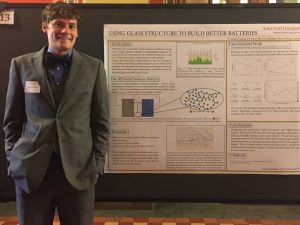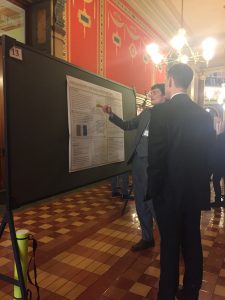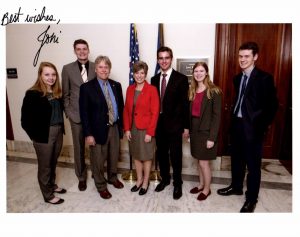Carter Francis, a junior studying materials engineering from Prior Lake, Minnesota, recently had the opportunity to be a voice for science and engineering by visiting with representatives at the state and national Capitol in Des Moines, Iowa and in Washington D.C.
On March 28, 2017, Francis participated in the annual Research in the Capitol Day in Des Moines. He spent his day with nineteen other Iowa State students as well as students from the University of Iowa and University of Northern Iowa. These students were selected as ambassadors to advocate for research at the three state universities. Francis made a poster to share his research project with legislators, reporters, top university administrators and students. It was displayed in the rotunda of the state capitol. This event was coordinated by the University Honors Program, but all undergraduates were eligible to apply.
“It was a pretty cool experience. The legislation was in session, and a couple of representatives came to talk to us about our projects. I got to meet other students and learn about a variety of other research projects that are being conducted in Iowa universities,” said Francis.
Francis was selected to present and display his two-year research project. He has been working with Department  of Materials Science and Engineering Professor, Dr. Steve Martin, to find a systematic method to test a series of glass compositions for ionic conductivity. The goal of Steve Martin’s research is to replace the organic liquid electrolyte materials in lithium-ion batteries. Therefore, ionic conductivity in a glass is very important. Organic liquids are volatile and using glass instead of organic liquids has proven to be more stable.
of Materials Science and Engineering Professor, Dr. Steve Martin, to find a systematic method to test a series of glass compositions for ionic conductivity. The goal of Steve Martin’s research is to replace the organic liquid electrolyte materials in lithium-ion batteries. Therefore, ionic conductivity in a glass is very important. Organic liquids are volatile and using glass instead of organic liquids has proven to be more stable.
“If you have more stability you increase the energy density of the battery, and you are able to make batteries better and safer. Professor Martin is also trying to make larger batteries for uses such as storing power for wind turbines. Large batteries need to be safe and not start a chain reaction,” said Francis.
One week after speaking with state representatives in Des Moines, Francis and a group of four other students, led by Adjunct Professor in the Department of Materials Science and Engineering, Iver Anderson, took a trip to Washington D.C. to represent the materials engineering student organization, Materials Advantage. Francis and the group of students spoke with Iowa representatives and legislative staffers about funding for the sciences. They visited with Joni Ernst (R-IA) and Chuck Grassley (R-IA), and they also got to meet Al Franken (D-MN).
 “Representatives like to have a personal story attached to the issues that they are hearing about. It helps them to see how the money is being used that they have been allocating,” said Francis.
“Representatives like to have a personal story attached to the issues that they are hearing about. It helps them to see how the money is being used that they have been allocating,” said Francis.
He continued, “One of the best experiences that I had while visiting our representatives was talking with a staffer in Washington D.C. about our research that we were conducting at Iowa State. She was really excited about what we were doing. She asked us how our needs could be fulfilled by our representatives. We watched her make notes in her notepad, and it made us feel like our stories mattered and that our projects are important.”
Francis described the value in visiting the capitol and sharing his research project with legislators. He said, “If you show up, it means you care, and if you show you are passionate about something, it is easy to spread your excitement about the topic.”
“From a student’s perspective, it’s hard to know what happens in the government if you are not learning about it on a regular basis, especially since we are immersed in engineering and science so often and not political science. The two experiences I had in Des Moines and in Washington D.C. helped to personify the government a little more,” said Francis. “Representatives are normal people like us, and they are interested in hearing our stories. I might have gotten more from the experience than the congressmen and women did, but I feel that it was beneficial for everyone. If there is no one advocating for the sciences, then progress cannot be made.”
Francis said that visiting representatives in Washington D.C. and Des Moines were both really interesting experiences.
He said, “It was cool that these experiences happened so close to one another so I could use what I learned from one experience in Des Moines and apply it to the next in Washington D.C.”
